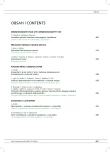Ocular Manifestation in Pituitary Apoplexy – a Case Report
Authors:
M. Macháčková 1; I. Látr 2; D. Hejcmanová 1
Authors‘ workplace:
Oční klinika LF UK a FN Hradec Králové, 2Neurochirurgická klinika LF UK a FN Hradec Králové
1
Published in:
Cesk Slov Neurol N 2009; 72/105(5): 456-460
Category:
Case Report
Overview
Pituitary apoplexy (PA) is a rare illness that arises upon acute bleeding into the hypophysis. This is a condition that is potentially life-threatening and is accompanied by various forms of neurological, endocrinological and neuroophtalmological symptoms. In the report the authors present a case of pituitary apoplexy in a 53-year-old male; one of his first symptoms was quickly developing paresis of the extraocular muscles accompanied by sudden development of diplopia, cephalalgy and disturbance of consciousness. The aim of this presentation was to demonstrate the problems associated with diagnosing this serious condition, which resembles subarachnoidal bleeding from a cerebral aneurysm due to its rapid onset and symptoms. Another aim was to examine the condition following one and a half year of monitoring.
Key words:
pituitary apoplexy – hypophysis adenoma – head nerves paralysis – subarachnoidal bleeding – Addisonian crisis – transnasal hypophysectomy
Sources
1. Lubina A, Olchovsky D, Berezin M, Ram Z, Hadani M,Shimon I. Management of pituitary apoplexy: clinical experi ence with 40 pati ents. Acta Ne urochir (Wi en) 2005; 147(2): 151 – 157.
2. Czajkowski M, Dąbrowski W, Rzecki Z, Bi ernacka J.Pituitary apoplexy after coronary artery bypass grafting surgery. Case Rep Clin Pract Rev 2005; 6 : 182 – 185.
3. Davi es JS, Rees DA, Evans LM, Scanlon MF. Pituitary apoplexy following combinati on chemotherapy – a case report. Endocrine - Related Cancer 1998; 5(2): 151 – 153.
4. Bailey P. Pathological report of a case of akromegaly, with especi al reference to the lesi ons in the hypophysis cerebri and in the thyro id gland: and a case of hemorrhage into the pituitary. Philadelphi a Med J1898; 1 : 789 – 792.
5. Bro ugham M, He usner AP, Adams RD. Acute degenerative changes in adenomas of the pituitary body - with speci al reference to pituitary apoplexy. J Ne urosurg 1950; 7(5): 421 – 439.
6. Vaphi ades MS. Pitu ary Apoplexy 2007. Dostupné z URL: http:/ / www.emedicine.com/ oph/ topic471.htm.
7. Bills DC, Meyer FB, Laws ER jr, Davis DH, Ebersold MJ, Scheitha uer BW et al. A retrospective analysis of pituitary apoplexy. Ne urosurgery 1993; 33(4): 602 – 608.
8. Verrees M, Arafah BM, Selman WR. Pituitary Tumor Apoplexy: Characteristics, Tre atment, and Outcomes 2004. Dostupné z URL: http:/ / www.medscape.com/ vi ewarticle/ 474903
9. Randeva HS, Schoebel J, Byrne J, Esiri M, Adams CB, Wass JA. Classical pituitary apoplexy: clinical fe atures, management and o utcome. Clin Endocrinol (Oxf) 1999; 51(2): 181 – 188.
10. Xenellis J, Stivaktakis J, Karpeta N, Rologis N, Ferekidis E. Pituitary apoplexy: a pathologic entity from an otolaryngologist‘s vi ew. ORL J Otorhinolaryngol Relat Spec 2003; 65(2): 121 – 124.
11. Abbott J, Kirkby GR. Acute visu al loss and pituitary apoplexy after surgery. BMJ 2004; 329(7459): 218 – 219.
12. Bahmani Kashko uli M, Khalatbari MR, Yahyavi ST, Borghei - Razavi HB, Soltan - Sanjari MS. Pituitary Apoplexy Presenting as Acute Painful Isolated Unilateral Third Crani al Nerve Palsy. Arch Iran Med 2008; 11(4): 466 – 468.
13. Cho WJ, Jo o SP, Kim TS, Se o BR. Pituitary Apoplexy Presenting as Isolated Third Crani al Nerve Palsy with Ptosis: Two Case Reports. J Kore an Ne urosurg Soc 2009; 45(2): 118 – 121.
14. Česák T, Náhlovský J, Látr I et al. Nádorová onemocnění hypofýzy. In: Náhlovský et al (eds). Ne urochirurgi e. Praha: Galén 2006.
15. Otradovec J, Jindrová M. Pituitární apoplexi e. Česk Oftal 1972; 28(6): 329 – 333.
16. Ayuk J, McGregor EJ, Mitchell RD, Gittoes NJ. Acute management of pituitary apoplexy - surgery or conservative management? Clin Endocrinol (Oxf) 2004; 61(6): 747 – 752.
17. Chu ang CC, Chang CN, We KC, Li ao CC, Hsu PW, Hu ang YC et al. Surgical tre atment for severe visu al compromised pati ents after pituitary apoplexy. J Ne uro oncol 2006; 80(1): 39 – 47.
Labels
Paediatric neurology Neurosurgery NeurologyArticle was published in
Czech and Slovak Neurology and Neurosurgery

2009 Issue 5
- Advances in the Treatment of Myasthenia Gravis on the Horizon
- Memantine in Dementia Therapy – Current Findings and Possible Future Applications
- Memantine Eases Daily Life for Patients and Caregivers
-
All articles in this issue
- Lumbar Spinal Stenosis and Neurogenic Claudicati on
- The Genetics of Parkinson’s Disease
- Dissoci ative Seizures
- Indication of Decompressive Craniectomy in Traumatic Brain Injury
- Changes in Fibrinolytic System after Continual Doppler Monitoring in Healthy Volunteers
- Posterior Antebrachi al Cutaneous Nerve Neuropathy – Case Reports
- Ocular Manifestation in Pituitary Apoplexy – a Case Report
- Cerebrospinal Fluid Drainage System Peritoneal Catheter Malfunction in Children
- Epilepsy Surgery Options in Patients after Brain Hypothermi a
- Agenesis, Aplasia and Hypoplasia of the Internal Carotid Artery
- The Use of the BOLD Effect when Examining Cerebrovascular Reserve Capacity
- Czech and Slovak Neurology and Neurosurgery
- Journal archive
- Current issue
- About the journal
Most read in this issue
- Lumbar Spinal Stenosis and Neurogenic Claudicati on
- Dissoci ative Seizures
- The Genetics of Parkinson’s Disease
- Indication of Decompressive Craniectomy in Traumatic Brain Injury
